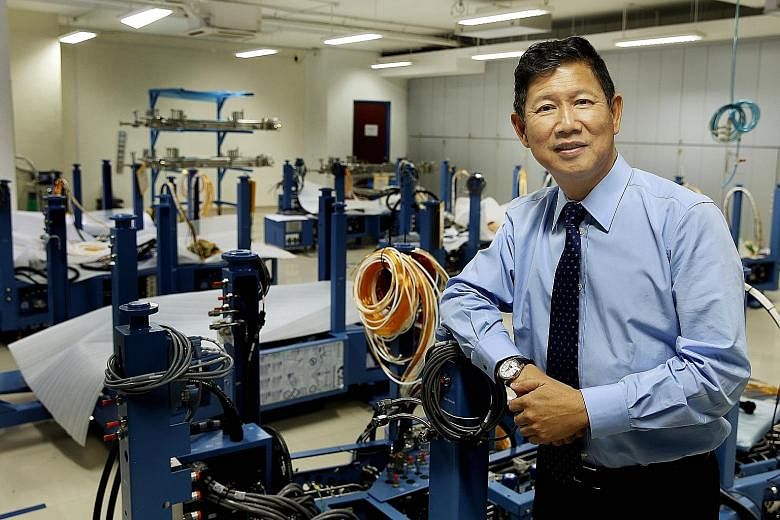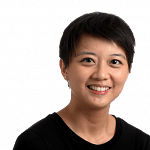UMS Holdings chief executive Andy Luong has big plans lined up for the precision engineering firm, as the global semiconductor industry is on the cusp of yet another boom.
The growth will be driven by mega trends in technology, such as the Internet of Things (IoT), autonomous vehicles, cloud computing and artificial intelligence.
"People talk about cloud computing, smart machines, autonomous vehicles, going paperless these days - that's the trend. And these products that can make life more convenient for everyone, it's better for us (as a company), because we're the ones providing the machines that can make them," Mr Luong, 57, told The Straits Times.
These trends, he noted, will help steer a revolution in next-generation chip designs - one that will require a gradual shift from 300mm to 450mm wafers - as the use of mobile devices and smart devices increases compared with that of personal computers and laptops.
"So there is a lot of potential in the business because technology is constantly advancing. There's no going backwards," said Mr Luong.
The signs are good. The mainboard-listed firm reported a stellar 77 per cent jump in second-quarter earnings to $11.5 million last Friday as revenue shot up 81 per cent to $42.7 million, thanks to robust sales in the semiconductor business.
Its market value stood at $463.5 million as at Friday, well up on the $261.8 million at the end of last year.
UMS intends to ramp up production space at its 600,000 sq ft facility in Penang by three times to cope with growing demand, in addition to its existing premises in Singapore and the United States. It employs around 500 staff globally, including about 100 in Singapore.
The company is also on the lookout for further merger and acquisition opportunities to expand its geographical footprint. Mr Luong acknowledged that in the longer term, the firm's operations are unlikely to grow in Singapore but somewhere else, because of manpower constraints and high costs here.
"But you still need the brand, and Singapore is a good brand," he said, adding that the Singapore office will remain as the company's headquarters, where it will oversee functions such as finance, marketing and customer service.
Beyond the semiconductor industry, UMS has been making investments in other areas as it moves to diversify the business. The company in March completed the acquisition of a 51 per cent shareholding in water and chemical engineering solutions firm Kalf Engineering.
"Over the years, we have concentrated heavily on the semiconductor, but it was also important for us to have some form of diversification," said Mr Luong.
"It's part of our risk-management strategy, because you don't want to put all of your eggs in one basket. It's a good egg, but we need to make sure we manage our risks."
Kalf Engineering last week incorporated a wholly owned unit in Shaoxing, China. This new firm will carry on the business of environmental management project, water disinfection, sewage, wastewater, drinking water treatment, water desalination, urban rainwater and flood management systems.
"The chlorination market is quite a niche one, and we're entering the market because we see there is a lot of potential for the business volume to be big," said Mr Luong, citing a rising need for water treatment as China, in particular, and other parts of Asia continue to urbanise.
Since it was set up here in 1997, UMS has grown from strength to strength. It is qualified for more than 50 special processes in the production of components for semiconductor equipment manufacturers, and offers precision engineering services to other industries, including the electronics, machine tools, aerospace, medical and oil and gas industries.
All of this would not have been possible if not for a piece of advice Mr Luong received from a college professor back in the 1980s, when he was a 21-year-old engineering student at City College of San Jose in California. His family had migrated from Vietnam to the US in 1975, during the Vietnam War.
"At that age, people go to school for one objective - to have a good job, a better life. And when we were selecting our courses for a new semester, I asked my professor: 'Sir, what class should I take so I can be successful?'
"He asked me what I wanted to do to become successful. Did I want to be a doctor, a dentist? I told him quite simply that I wanted to make money. His reply was: 'In your case, you already know your answer. You should go make money.'
"So the same day, I went to register my company with US$2,000 in my pocket. I called it Luong's Manufacturing. I was still carrying my backpack," he said with a laugh.
Mr Luong, who holds US citizenship and is a permanent resident here, left school that year, and has not looked back. He is married with two daughters aged 13 and 25, with the elder one now working at a food distribution start-up in Silicon Valley, where he had also started out.
"I've asked her to come back, but she doesn't want to. I guess the spirit of entrepreneurship could really run in the family," he said.


